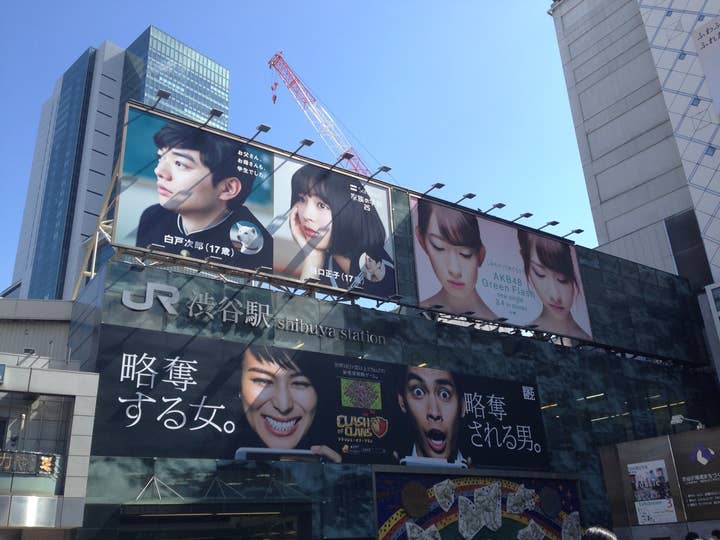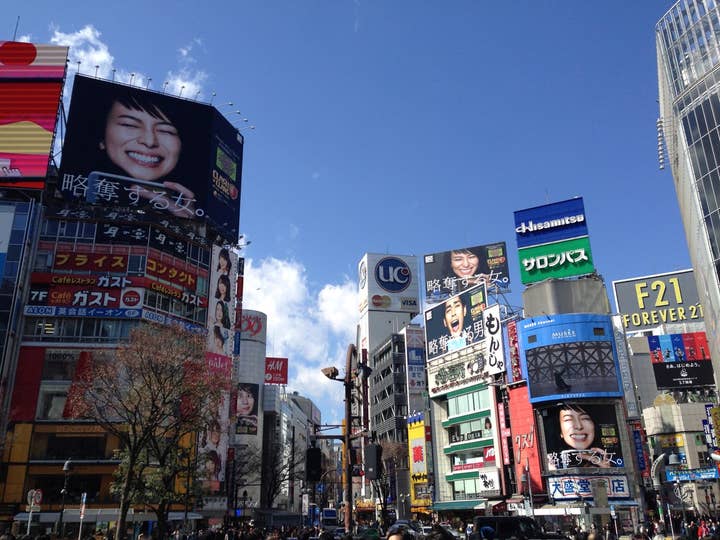Japan: Mobile game marketing reaches new heights
Huge outdoor and TV campaigns have become essential for mobile game launches in Japan; success in this field has never been so expensive
The scramble crossing outside Shibuya Station is perhaps the most famous and instantly recognisable of Japan's landmarks; a confluence of neon-lined ravines where stories-tall posters and screens beam out from all angles at a chaotic soup of pedestrians - young and old, tourist and local, but predominantly fashionable and youthful - who treat the crossing as their de facto meeting point and the hub from which to embark on shopping, socialising and drinking adventures in a district that endures as one of Tokyo's most fashionable.
If you visited Shibuya this week, you might have noticed that the crossing and its iconic advertising spaces have also become something else - the latest high-profile marketing campaign for Supercell's F2P mobile game Clash of Clans, whose gigantic posters presently dominate the crossing and the station-front. This is the view across the crossing, directly after walking out of the station; the dark-coloured posters featuring close-ups on people's faces are the Clash of Clans ads. Four of them occupy the largest spaces overlooking the crossing; a fifth, in the background, is on the front of the famous Shibuya 109 building.

The second picture is taken from the same spot, but turned 180 degrees to look back at the station building itself; here, too, you can see two of the dominant ads are for Clash of Clans (the two above are an ongoing campaign for mobile network SoftBank, which is the parent company of Clash of Clans developer Supercell, and a promotion for the new single from inexplicably popular girl-group AKB48).

In short, one of the busiest intersections in Tokyo, with some of the most high-profile, famous and expensive advertising spaces in the world - second, I suspect, only to New York's Times Square - is currently totally dominated by advertising for a three year old free-to-play mobile game. Moreover, this campaign is explicitly targeting women; the slogans under the delighted-looking women in the posters say "Looting Woman", while the shocked-looking men (featured in just two of the five posters) are captioned as "Looted Man".
The reason that I bring this particular campaign to your attention, however, is not because it is unusual; quite the contrary, in fact. The Clash of Clans takeover of Shibuya Crossing is merely the latest in a series of expensive, high-profile marketing campaigns for mobile games - campaigns that have become a fixture of the industry landscape in Japan. It's now entirely commonplace to encounter enormous outdoor billboards promoting mobile games, or to step onto a train only to discover that every advertising space (posters, window stickers, video screens and even, in some cases, floors and ceilings) has been taken over with a campaign for an upcoming mobile card game or RPG. Ad breaks on prime-time television regularly include expensively-produced CG animated promotions for new mobile titles. Puzzle & Dragons, in particular, ran a fascinating campaign last year which used TV and outdoor media spaces not so much to promote the game as to give tips on how to play it better; TV commercials and video screens on trains showed clips of people playing the game skilfully and using specific tricks to chain more attacks together.
"Japan has never been shy about high-profile mainstream marketing for games, but marketing campaigns for traditional console games are now almost entirely eclipsed by those for mobile titles"
Japan has never been shy about high-profile mainstream marketing for games, but marketing campaigns for traditional console games are now almost entirely eclipsed by those for mobile titles. TV campaigns for console games aimed at adults are relatively rare; in recent months, only PS Vita title God Eater 2: Rage Burst has been heavily advertised on evening television, while the last console game to get a really significant outdoor advertising campaign was probably Mario Kart 8. Nintendo does maintain ongoing brand campaigns, perhaps most notably on the JR commuter train lines in Tokyo, and child-focused campaigns are another story entirely (that market remains heavily focused on the 3DS, and franchises like Yokai Watch and Pokemon are ubiquitous). By and large, though, if you see a huge marketing campaign for a game in Japan today, it's probably a smartphone title.
While above the line marketing for mobile titles is no longer a rare thing in most western countries either, the scale and some planning features of these Japanese marketing campaigns reveals a number of interesting and important things about the mobile game market here - many of which may become increasingly pertinent in the western market in coming years. Firstly, the scale and cost of the campaigns speaks volumes about the difficulty and expense of breaking into this market. When companies resort to purchasing some of the world's most expensive outdoor advertising space as a player acquisition strategy, it's clear that the era in which a plucky upstart could make a killing in mobile gaming with minimal investment is all but over. Future "rags to riches" stories in this market will be black swans, at best; PR-managed falsehoods, at worst.
Secondly, the nature of those campaigns is equally telling. There are two distinct categories of campaign - those for established games, and perhaps more unusually, those for as-yet unreleased games. Established game campaigns are those like the Clash of Clans takeover pictured above, or the Puzzle & Dragons "game skills" focused ads, which are attempts to boost the lifespans of a very successful games that have been on the market for several years. The enduring success of these giants is another major barrier to entry in this market; whereas in the paid-for indie market, for instance, you merely need to be one of the most interesting games released that month, in the F2P mobile market you are competing from the outset with established giants whose enormous success has also given them enormous marketing budgets.
"one of the great advantages of advertising a mobile game outdoors is that the viewer can generally see the ad and act upon it immediately, downloading the game to their phone and beginning to play within a matter of a few minutes"
More unusual, at least from a western perspective, are the pre-launch campaigns for major upcoming mobile titles. These campaigns have been growing in prominence and expense in the past year, and focus on getting users to pre-register for games that have not yet launched. In the conventional wisdom of the mobile world, this is absolutely cart-before-horse; one of the great advantages of F2P mobile development is the ability to create a minimum viable product and soft-launch a game in order to test the market without enormous up-front investment. Moreover, one of the great advantages of advertising a mobile game in outdoors or above-the-line positions is that the viewer can generally see the ad and act upon it immediately, downloading the game to their phone and beginning to play within a matter of a few minutes. Pre-launch campaigns suggest that the latter consideration is being shelved in favour of establishing mindshare and getting a huge launch day, while the former aspect is being ignored entirely, with enormous development and marketing budgets being poured into highly speculative mobile titles - with echoes of exactly the problems with AAA development from which mobile was, in theory, meant to rescue the industry.
Indeed, while fans of traditional Japanese console games may be a bit dismayed to see Clash of Clans, Puzzle & Dragons, GranBlue Fantasy and their ilk advertised so intensively, seemingly at the expense of the console market, this gut reaction may miss the reality of the situation - that Japanese mobile games are looking more and more like console titles. The business model may differ (although as a rule, Japanese mobile games are a bit less aggressive in their monetisation, rarely falling into the common western pitfall of an over-simplistic energy mechanic that frustrates players by refusing to let them play the game much), but as budgets grow and launch-day downloads become increasingly important, the degree of polish, depth and complexity of leading mobile games has also increased greatly.
Whether the expensively developed titles doing so well in the Japanese market will ever translate their success to overseas territories is another question entirely - and Supercell's remarkable titles aside, western mobile game developers also struggle to reach the upper echelons of the Japanese charts. Even if the games leading the charge are different, though, the effects will likely be the same; the Japanese experience strongly underscores the likelihood of an increase in complexity and quality for mobile titles, matched by an enormous development and marketing budgets. Along the way, no doubt, we'll see mobile games plastered all over some other surprisingly iconic locations around the world.

